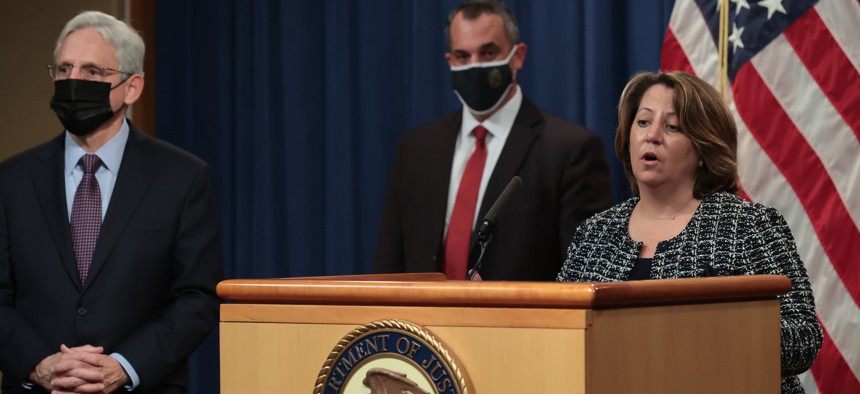Justice Builds Out Crypto Tracking, International Engagement Teams on Ransomware

WASHINGTON, DC - NOVEMBER 08: U.S. Deputy Attorney General Lisa Monaco (R) speaks during a news conference with Attorney General Merrick Garland and other federal law enforcement officials at the Robert F. Kennedy Main Justice Building on November 08, 2021 in Washington, DC. (Photo by Chip Somodevilla/Getty Images)
The Justice Department will now require prosecutors to consult with the international and cyber crime specialists on significant cyber investigations.
The Department of Justice is adding another woman to the top ranks of those hunting and intercepting cyber criminals on the blockchain, according to Deputy Attorney General Lisa Monaco, who announced an expansion of the department’s efforts to combat ransomware and other illicit activity like cryptocurrency-related money laundering.
“Today the [National Cryptocurrency Enforcement Team] gains its first director, Eun Young Choi, a seasoned computer crimes prosecutor and a leader in the field,” Monaco said Thursday during the Munich Security Conference.
Monaco announced the creation of NCET last fall. On Thursday she noted the team’s growth—it now has about a dozen prosecutors—and its role conducting a record-breaking seizure last week of $3.6 billion in stolen Bitcoin.
“The department has been at the forefront of investigating and prosecuting crimes involving digital currencies since their inception,” Choi, who was previously serving as Monaco’s senior counsel, said in a press release from Justice. “The NCET will play a pivotal role in ensuring that as the technology surrounding digital assets grows and evolves, the department in turn accelerates and expands its efforts to combat their illicit abuse by criminals of all kinds.”
As part of a push to increase international engagement on the ransomware front, Monaco also launched the international virtual currencies initiative, created a new post for a U.S. liaison based in Europe, and will require any prosecutor working on a significant cyber case to consult with international and cybercrime specialists.
“It's the rare cyber investigation that doesn't have an international dimension,” she said. “International cooperation will not be an afterthought.”
Recounting the Bitcoin recovery and other recent successes the department has had— including first-time use of a traditional warrant to execute code and erase digital backdoors—Monaco said it was “just the beginning of what the department can do” and also announced the formation of a new virtual exploitation unit at the FBI.
“This FBI unit will combine cryptocurrency experts into one nerve center that can provide equipment, blockchain analysis, virtual assets seizure and training to the rest of the FBI,” she said.
Citing the September 11th attacks and stressing crime prevention, Monaco also reiterated plans the department has already expressed to focus less energy strictly on prosecuting criminals and more of it obstructing their schemes with the help of partners like US Cyber Command.
“Moving forward, prosecutors, agents and analysts will now assess, at each stage of the cyber investigation, whether to use disruptive actions against cyber threats, even if they might otherwise tip the cybercriminals off and jeopardize the potential for charges and arrests,” she said. “Before we bring charges we will assess whether there are steps we can take to prevent or reduce the risk to victims steps like providing decryption keys or seizing servers used to further cyber attacks.”






